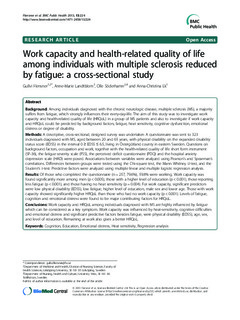| dc.identifier.citation | Flensner, G., Landtblom, A.-M., Söderhamn, O., & Ek, A.-C. (2013). Work capacity and health-related quality of life among individuals with multiple sclerosis reduced by fatigue : a cross-sectional study. BMC Public Health, 13, 1-10. doi: 10.1186/1471-2458-13-224 | no_NO |
| dc.description.abstract | Background: Among individuals diagnosed with the chronic neurologic disease, multiple sclerosis (MS), a majority suffers from fatigue, which strongly influences their every-day-life. The aim of this study was to investigate work capacity and health-related quality of life (HRQoL) in a group of MS patients and also to investigate if work capacity and HRQoL could be predicted by background factors, fatigue, heat sensitivity, cognitive dysfunction, emotional distress or degree of disability. Methods. A descriptive, cross-sectional, designed survey was undertaken A questionnaire was sent to 323 individuals diagnosed with MS, aged between 20 and 65 years, with physical disability on the expanded disability status score (EDSS) in the interval 0 ≥ EDSS ≤ 6.5, living in Östergötland county in eastern Sweden. Questions on background factors, occupation and work, together with the health-related quality of life short form instrument (SF-36), the fatigue severity scale (FSS), the perceived deficit questionnaire (PDQ) and the hospital anxiety depression scale (HAD) were posed. Associations between variables were analyzed using Pearson's and Spearman's correlations. Differences between groups were tested using the Chi-square test, the Mann Whitney U-test, and the Student's t-test. Predictive factors were analyzed using multiple linear and multiple logistic regression analysis. Results: Of those who completed the questionnaire (n = 257, 79.6%), 59.8% were working. Work capacity was found significantly more among men (p < 0.005), those with a higher level of education (p < 0.001), those reporting less fatigue (p < 0.001), and those having no heat sensitivity (p = 0.004). For work capacity, significant predictors were low physical disability (EDSS), low fatigue, higher level of education, male sex and lower age. Those with work capacity showed significantly higher HRQoL than those who had no work capacity (p < 0.001). Levels of fatigue, cognition and emotional distress were found to be major contributing factors for HRQoL. Conclusions: Work capacity and HRQoL among individuals diagnosed with MS are highly influenced by fatigue which can be considered as a key symptom. Work capacity was influenced by heat-sensitivity, cognitive difficulties and emotional distress and significant predictive factors besides fatigue, were physical disability (EDSS), age, sex, and level of education. Remaining at work also gives a better HRQoL. | no_NO |
